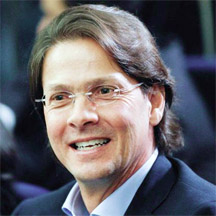CARACAS, (Reuters) – Socialist leader Nicolas Maduro and the billionaire boss of Venezuela’s biggest private company have buried the hatchet after a war of words over food shortages and other economic problems in the South American nation.
Perpetuating the hard-line rhetoric of his predecessor Hugo Chavez, newly-elected Maduro turned on Empresas Polar president Lorenzo Mendoza in recent days, accusing him of hoarding products as part of an “economic war” on the state by private business.
Mendoza, whose company is Venezuela’s biggest beer- and flour-maker, denied that and pointedly challenged the government to sell production plants nationalized under Chavez back to the private sector to boost efficiency.
On Tuesday night, the pair met to discuss their differences in a spat seen by Venezuelans as a bellwether for state-business relations going forward under Maduro’s government.

Both sides came out of the meeting sounding reconciliatory and pledging to work together to overcome food shortages that have increased tensions in Venezuela after Maduro’s disputed election win last month.
“It was very cordial, direct, sincere meeting … We clarified we are producing at full capacity,” Mendoza said.
“The president was very kind in listening to us and communicating the need to keep investing, producing and supplying markets. That is our lifelong commitment, passion and vocation … Part of this issue (shortages) has to do with the high politicization (in Venezuela).”
Vice President Jorge Arreaza gave a similar account of the meeting. “The problem’s been overcome,” he told state TV.
TOUGH ECONOMIC PANORAMA
Supplies of food and other basic products have been patchy in recent months, with long queues forming at supermarkets and rushes occurring when there is news of a new stock arrival.
The situation has spawned jokes among Venezuelans, particularly over the lack of toilet paper. The government announced this week it was importing 50 million rolls to compensate for “over-demand due to nervous buying.”
Authorities have also allowed increases in some price controls on products – including basics like chicken, beef and milk – to the consternation of consumers but relief of private businesses that complain of sometimes having to sell at a loss.
Mendoza’s Polar is a central player in the Venezuelan economy, employing more than 31,000 people and accounting for 3 percent of non-oil GDP, according to its own figures.





